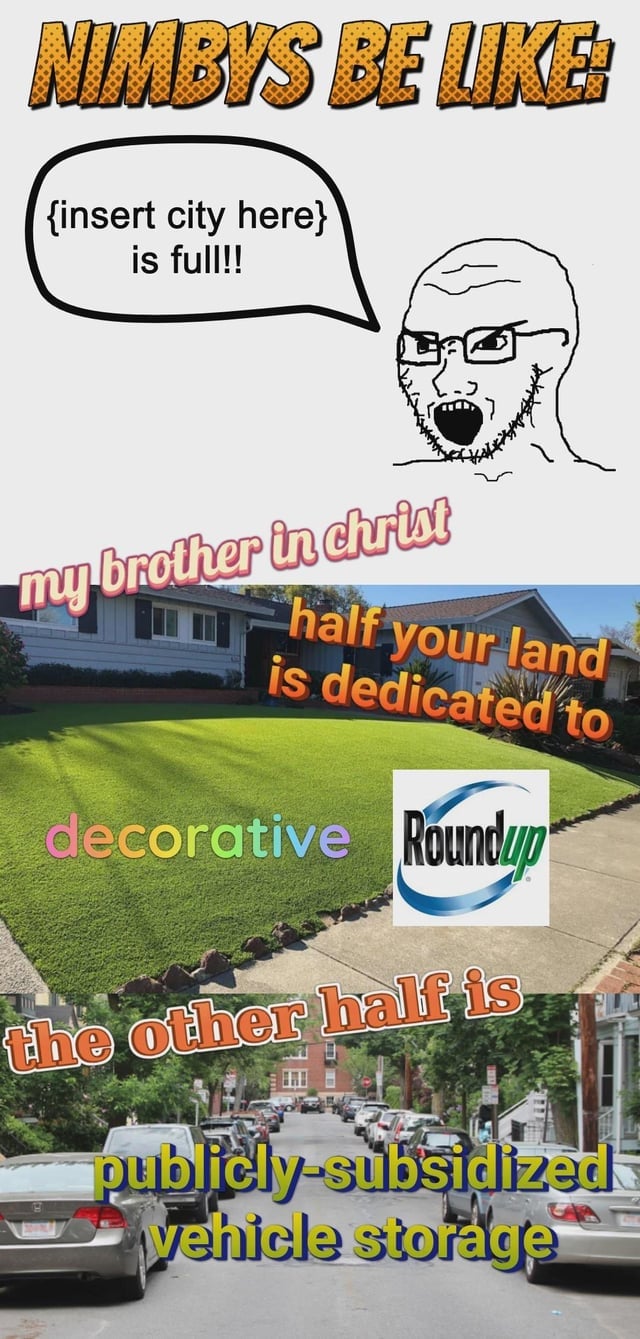view the rest of the comments
Fuck Cars
A place to discuss problems of car centric infrastructure or how it hurts us all. Let's explore the bad world of Cars!
Rules
1. Be Civil
You may not agree on ideas, but please do not be needlessly rude or insulting to other people in this community.
2. No hate speech
Don't discriminate or disparage people on the basis of sex, gender, race, ethnicity, nationality, religion, or sexuality.
3. Don't harass people
Don't follow people you disagree with into multiple threads or into PMs to insult, disparage, or otherwise attack them. And certainly don't doxx any non-public figures.
4. Stay on topic
This community is about cars, their externalities in society, car-dependency, and solutions to these.
5. No reposts
Do not repost content that has already been posted in this community.
Moderator discretion will be used to judge reports with regard to the above rules.
Posting Guidelines
In the absence of a flair system on lemmy yet, let’s try to make it easier to scan through posts by type in here by using tags:
- [meta] for discussions/suggestions about this community itself
- [article] for news articles
- [blog] for any blog-style content
- [video] for video resources
- [academic] for academic studies and sources
- [discussion] for text post questions, rants, and/or discussions
- [meme] for memes
- [image] for any non-meme images
- [misc] for anything that doesn’t fall cleanly into any of the other categories

Grass has an extremely low runoff coefficient. The water absorption is almost on par with impervious surfaces. This is because the root system of most turf/gras systems is only a few inches deep. On the other hand native grasses, fescues, and trees are excellent for water infiltration! Rain gardens are also good choices as they promote pollinators. I'm a landscape architect --happy to answer any questions.
Errata: meant to say high runoff coefficient --not low.
It really depends on the specific grass and underlying soils, as you say.
I'm the guy at the City making landscape architects and civil engineers comply with drainage and water quality regulations.
We live off the tears of developers.
Planner I'm guessing? Are you the one I'm fighting the minimum parking requirements for each project? 🥲
Planning yes. But we fight over impervious cover over the aquifer recharge zone and building retaining walls in in conservation and drainage easements.
And setbacks. Good god we fight over setbacks.
Im going to look up rain gardens right now, sounds awesome
Low runoff coefficient means more absorption and less runoff, even sod typically has a C of around 0.3, as opposed to the 0.95 of concrete.
I agree more natural landscaping is better!
Good catch. Still, very low infiltration compared to native grasses. I have the papers on it parked somewhere.
My backyard slopes towards the house and during heavy rains the cellar floods which, okay, it's a cellar with limestone block walls, it's not supposed to be waterproof, but... is there anything I can do to make this happen less often?
Yes. There's several possible approaches to redirecting storm water: You could build a french drain or you could regrade the slopes to redirect the flow around the house. I don't want to give too specific recommendations because I don't have a survey or am familiar with the exact conditions of your lot. I don't think infiltration is an option in your case though. The goal is to get the water away.
Thanks. I figured regrading was best but I haven't gotten around to it. It's been less of a problem since we started putting up raised garden beds but I thought, hey, might as well ask.
No problem any other Qs feel free to pm!